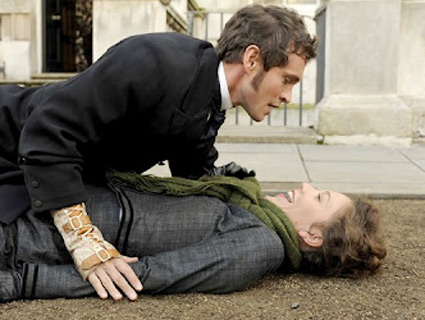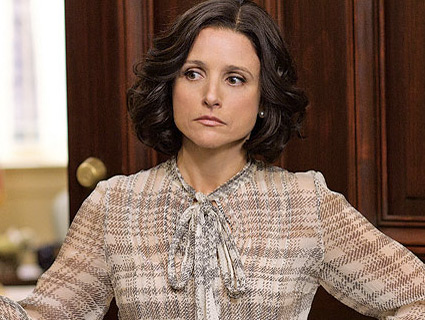
NSFW.Photo courtesy of Sony Pictures Classics
Hysteria
Sony Pictures Classics
95 minutes
Allow me to be straight with you: Half of this movie is just watching physicians in 19th-century England getting rich old ladies off.
Now for a quick history lesson: Hysteria is set in London in the late 1800s—a time when the word “horny” had not yet entered the women’s medical lexicon. Whenever a housewife or a mistress got into a sexually-repressed fidgety funk, medical professionals of the time—men who knew less about female sexuality than a Pomeranian puppy does—would simply diagnose them as suffering from the “disease” of female hysteria, a term used to cover emotional instability and jittery behavior. (This diagnosis remained on the books at the American Psychiatric Association up until the early 1950s.)
And what, you ask, did these Victorian doctors prescribe to calm their women patients? Why, a physician-administered volcanic orgasm, of course!
That’s where Dr. Mortimer Granville (played by the versatile Brit actor Hugh Dancy) comes in, to apply his professional turbo-fingering to the cause of mental health. As a rising star at Dr. Robert Dalrymple’s (the always worthwhile Jonathan Pryce) premier clinic, Mortimer gets paid top dollar to devote his talents exclusively to masturbating the hell out of the era’s 1 percent. It’s a lucrative business, bringing dozens of women to full-blown “paroxysm,” as he repeatedly labels the sensation, day in and day out. That is, until he develops carpal tunnel syndrome from kneading too many Englishwomen down south.
And just like a cricketer who develops the yips, Mortimer is out of a job and jettisoned from West End high society. It’s then that he comes up with the groundbreaking idea to use a machine to stimulate clitorises for him. With the help of dear friend Edmund (an awkwardly feisty Rupert Everett), Mortimer remodels an electronic feather duster into the world’s first vibrator. The prototype sort of explodes, but they decide to put it between their patients’ legs anyway. After successful trial runs, they brainstorm on names for the appliance, including “the sorcerer’s apprentice” and “the excitator.”
Eureka!
As interesting a plot as this may seem, it merely provides a backdrop to the film’s more conventional storyline: The opposites-attract style romance between Mortimer and Charlotte (a peppy and charismatic Maggie Gyllenhaal), one of Robert’s daughters. Charlotte is a headstrong feminist and tenacious working girl who specializes in things that pay significantly less than tickling ruling-class loins, like running a soup kitchen and espousing politically progressive dogma.
“You, ma’am, are a socialist,” Mortimer shyly accuses Charlotte, after she goes off on a rant about voting rights. “Why not?” Charlotte replies with brio. “Socialism is nothing more than people pulling together!” (If this movie has a shred of commercial success beyond the indie circuit, we’ll have to brace ourselves for yet more Fox News bedwetting over supposed pinko indoctrination by Hollywood.)
So there you have it: If you’re in the market for a leftist date movie centered around the genesis of this fella…
 The Medical Center for Female Sexuality…then the offbeat Hysteria fits your demographic.
The Medical Center for Female Sexuality…then the offbeat Hysteria fits your demographic.
Mortimer’s unlikely rise to stardom (very loosely cribbed from the true story of one Dr. Joseph Mortimer Granville) is where this rom-com derives its charmingly tawdry com. It is at times unquestionably amusing to watch these people react to the feminine climax as if they’ve just discovered the Ark of the Covenant. In one scene, the three men strap on protective goggles before using their newly patented electro-pleasure-snake to literally make a fat lady sing.
But the comic novelty can only be stretched so wide, and the parade of giddy orgasm gags get old—maddening, even—as the film staggers to its final chapter. The irony is that the comedy itself becomes, yes, rather masturbatory.
Director Tanya Wexler and screenwriting duo Jonah Lisa and Stephen Dyer manage to bring a few wafers of wit and edginess to the table; but the resulting chuckles are rendered forgettable by the larger and longer slabs of half-assed humor. The chemistry between the hugely talented Gyllenhaal and Dancy is palpable, but the courtship and repartee don’t rise above period-piece formula. And though Hysteria‘s intentions and morals are all well and good (women’s liberation, feel-good politics, charity), its civics often veer onto preachy terrain—particularly during a courtroom scene when Charlotte rattles off a laundry list of platitudes while on trial for assaulting some butt-headed constable.
Good vibrations? Sadly, not quite.
Hysteria gets a wider release on Friday, May 25. The film is rated R for sexual content. Click here for local showtimes and tickets.
Click here for more movie and TV features from Mother Jones. To read more of Asawin’s reviews, click here.














